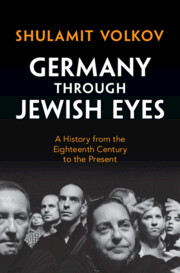Book contents
- Germany through Jewish Eyes
- Germany through Jewish Eyes
- Copyright page
- Contents
- Acknowledgments
- Introduction: A Jewish Gaze – Plural and Unique
- Part I Learning to Know Germany: 1780–1840
- 1 Enlightenment without Toleration
- 2 Benevolent Autocracy
- 3 The Half-Open Society
- Part II Liberty, Unity, Equality: 1840–1870
- Part III Living in Germany: 1870–1930
- Part IV A Lost Homeland: 1930–2000
- Epilogue: Berlin is not Weimar
- Index
2 - Benevolent Autocracy
from Part I - Learning to Know Germany: 1780–1840
Published online by Cambridge University Press: 14 November 2024
- Germany through Jewish Eyes
- Germany through Jewish Eyes
- Copyright page
- Contents
- Acknowledgments
- Introduction: A Jewish Gaze – Plural and Unique
- Part I Learning to Know Germany: 1780–1840
- 1 Enlightenment without Toleration
- 2 Benevolent Autocracy
- 3 The Half-Open Society
- Part II Liberty, Unity, Equality: 1840–1870
- Part III Living in Germany: 1870–1930
- Part IV A Lost Homeland: 1930–2000
- Epilogue: Berlin is not Weimar
- Index
Summary
This chapter moves to the last phases of the French occupation in parts of Germany and to the improved position of the local Jews in these regions. It then concentrates on the efforts to legalize Jewish equality in the constitution of the new German Bund, discussed in a special committee at the Congress of Vienna, and within this context, it examines the position of a number of important German politicians towards Jewish emancipation. While Wilhelm von Humboldt’s liberal approach is relatively well known, but appears to be more complex on taking a closer look, it is interesting to observe the position of another Prussian politician, Karl August von Hardenberg, and especially that of the Austrian foreign minister chairing the entire congress, Metternich. Both were much more conservative, but still supported Jewish equality, insisting it must apply to Germany as a whole. In the end, this question remained undecided, like so many other issues relating to the planned constitution, mainly because of the pressure from the presumably much more liberal bourgeoisie in the various cities of the new Bund.
Keywords
- Type
- Chapter
- Information
- Germany through Jewish EyesA History from the Eighteenth Century to the Present, pp. 28 - 43Publisher: Cambridge University PressPrint publication year: 2024

